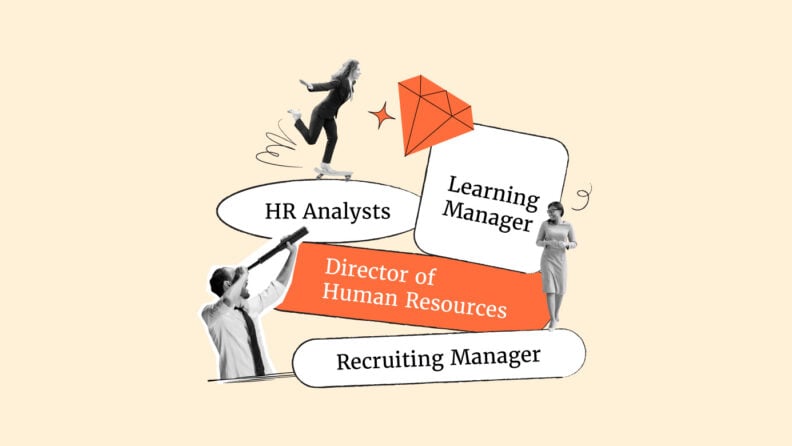After such a tumultuous year in which layoffs and restructuring have been as common as talk of AI and strikes, HR professionals may find themselves wondering what the most in demand HR roles are now.
A good amount of departments are restructuring and the talent pool is being shaken up as a result. That means HR is going to be busy.
Where HR was once seen as an admin function involved in the hiring and firing process, employee benefits and harassment claims, today it is central to core business functions and goals.
From shaping the employee experience to creating a benefit structure and company culture which keeps the business competitive for top talent, HR is a strategic force with a significant influence on business outcomes.
HR leaders are critical to the business and work closely with CEOs for good reason. Results are created by people and people are influenced by their experience, company culture, and whether they feel valued or not.
What’s Changing In HR?
Few events in history have changed the world the way the pandemic did and the same goes for HR. Pre-pandemic HR practices were more commonly focused on what happened in office environments between co-located teams.
Today, HR is challenged with refining new work models, figuring out how to mix office and remote work cultures and balancing employee needs and wants with expectations from the rest of the C-suite.
Since the 1920s and the experiments of Elton Mayo at the Western Electric Company in Chicago, we’ve known that employee motivations go far beyond money. Being a member of a team that can collaborate and support each other in a cohesive way goes further than ping-pong tables and goofy office perks.
RESOURCE: Human Resources Career Path: Your Options Analyzed 2023
Supportive, cohesive and collaborative teams? It’s no surprise then that HR’s challenge of finding the right people, processes and tools is what’s driving change in the field.
Demand for Technology
It’s not just Slack and project management apps that have changed the way people interact at work. There’s a plethora of new HR technology debuting seemingly everyday for a new function. From performance management tools to payroll and benefit assistance, there’s no end to the technological solutions available to HR.
But understanding it, making it work cohesively with your HRIS, learning management system (LMS) and the tech people use in their work is a challenge. Increasingly, HR leaders have to be, not just tech savvy, but forward thinking about the tools they choose, the tech they are using and what it means for teams and employees.
“The average company deployed 58 new applications or tools in 2015, whereas in 2022 that number has increased to 89. At large employers, that figure is 187,” writes Learning and Development Manager Marcos Guevara. This type of investment in virtual tools requires a similar investment of time and resources into training on how to use them effectively, which helps drive adoption and usage rates when implementing a new tool.”
The Power of Process
Whether it’s talent recruitment, performance management or helping an employee through a difficult time, HR is a job driven by processes and standards that are put in place by leadership.
But process is ever evolving as new ideas take hold. In the 2010s, as Silicon Valley changed the way we live, work and do just about anything in between, the processes it used to innovate were replicated and mimicked by just about every business where someone got a paycheck for using a computer.
In the 2020s, processes continue to be refined as project management is more than a job, it’s a discipline many leaders have to learn as they take on the biggest challenges the business faces. HR is no different, but it also has to reconcile people needs with both the technology and the process.
“We have to be able to stop, reflect, and shift our behaviors, collaboratively and in alignment based on humans not process,” says Dr. Tammy Watchorn, Director at AnSás Consulting and QUBE Unlimited. “If software was the solution, guess what… we would already have all the magic answers and wouldn’t need to ask questions.”
It Always Comes Back to People
The biggest challenge for HR remains a people challenge. A volatile talent market where candidate expectations are different than they were 10 years ago combined with quickly evolving business needs has made it difficult for HR to keep up with the demands of talent recruitment, management and development.
For this reason, the number of HR career paths available are proliferating and HR roles we’re about to dig into are all experiencing growth.
Top In-Demand HR Roles
The roles we’ll take a look at in this section are not a comprehensive list of HR job titles. They are simply growing in terms of demand and prevalence and vary in terms of seniority, the experience required to attain them and compensation.
Compensation and Benefits Managers
These HR professionals design and oversee compensation and benefits for the entire company.
They manage health insurance, paid leave, retirement plans, and are knowledgeable in regulations like ERISA, COBRA, and HIPAA.
Handling sensitive data, they must communicate clearly, work efficiently and maintain a proactive attitude. They often collaborate with payroll teams on tasks such as onboarding, offboarding, and benefit deductions.
Positions in compensation and benefits are expected to continue growing at a steady rate, with Robert Half estimating them to be the second most in-demand HR role.
The median annual pay in 2022 was $131,280.
Director of Human Resources
This professional oversees the HR department, aligning it with company objectives and ensuring legal adherence. They are more focused on strategy and larger business outcomes than tactics and day-to-day operations.
HR Directors oversee recruitment, training, the identification of staffing needs and stay up to date on HR trends. They also manage department budgets and communicate with executive teams.
They are champions for professional development and research organizational trends for the company to analyze and set goals around.
Projections on job growth for HR directors vary, but the Bureau of Labor Statistics estimates a 5% growth of HR managers through 2032. The average total compensation for HR directors is $179,153.
HR Analysts
HR analysts are experts who gather and interpret different HR-related data to advise on a company's retention, compliance, and hiring tactics.
They also gather information from payroll, exit interviews, staff feedback and employment histories to spot patterns in hiring methods, staff motivation and attrition rates.
These experts are an important part of introducing new processes, suggesting policies to enhance the company's work environment and employing key performance indicators to assess workforce productivity.
Job growth in the field is expected to be 11%, with an average salary for HR analysts of $69,000.
HR Business Partner
Focused heavily on strategic HR management, there are now more than 100,000 people in the United States working under the title of HR Business Partner. Many of these professionals enhance their credentials through CHRO certifications to advance into executive roles.
HRBP’s have a complex role as they must be able to marry data analytics expertise with the ability to coach and be a consultant to business leaders. They are most common at organizations with more than 10,000 employees and in industries such as tech, finance and healthcare.
The role is fast evolving in the post pandemic era and requires the HRBP to work closely with department heads while serving as a bridge between HR and business units to ensure alignment of culture, objectives and practices.
HRBP roles are expected to grow by 7% through 2028. Their average salary is $86,363, according to data from Zippia.
Leadership Coach
Leadership coaches are industry professionals who mentor and guide upper management teams, helping them grow and identify new opportunities for the business.
They provide motivation, present analyses on the company's workflow to pinpoint areas of success and potential improvements and assist in setting attainable goals for the organization.
These mentors are resources for continuous development. They schedule training sessions, and highlight specific skills and performance gaps for current and aspiring leaders.
As coaches, they utilize specific technologies to evaluate performance, log client interactions and track metrics, ensuring the company's continual growth and development of people with leadership skills.
It’s a fast growing, multi-billion dollar field with more than 90,000 professionals globally in the role. The annual pay in the United States is estimated to be $160,449 before bonuses, according to Glassdoor.
Professional Development Managers
Professional development managers oversee employee growth, designing programs tailored to individual needs and company objectives.
They analyze workforce development needs and strategize solutions, requiring strong leadership and communication skills to convey the benefits of learning and development to the C-suite.
Working primarily in office settings, they manage assessments, are adept with HR software, and collaborate with teams on innovative solutions. Their role encompasses refining career skills, executing impactful campaigns and overseeing the creation of development materials.
As retention rates have suffered over the last few years, more and more companies are investing in professional development leaders.
Payscale’s Top Jobs and Skills in HR Wage Report concludes that the median salary for Professional Development Managers is $308,000.
Tip: consider taking a workforce development certification to gain the skills you need.
Learning Manager
That investment in training extends through the talent development ranks. A Learning Manager’s primary responsibilities include identifying training needs, designing educational content, coordinating learning sessions and evaluating the effectiveness of training programs.
They collaborate closely with all departments to ensure employees possess the necessary skills and knowledge for their roles.
They also have to stay up to date on the latest educational techniques and tools, ensuring that the organization remains competitive in its training approaches.
According to the Payscale assessment, the median pay for Learning Managers is $214,000.
Wellness Coordinator
The pandemic brought an increased awareness around employee wellness for both HR and the employee themselves. As wellness benefits became a more important part of remaining competitive for talent, wellness coordinators and Employee Assistance Program (EAP) Counselors played a greater role in operational goals such as talent retention than ever before.
Payscale’s assessment shows that these two positions are among the top HR jobs for fastest wage growth, with a median pay for wellness coordinators at $72,500, up 14.6% in the last year. EAP Counselors had a median salary of $81,300, an increase of 15.3%.
Recruiting Manager
The war for talent never really ends. That’s why the recruitment sector saw growth in 2024 and will again in 2025. It’s a $23 billion industry with well defined product and service segmentation, such as temporary staffing services, executive search services, permanent placement services and independent contractor placement.
In tech in particular, the competition for sourcing talent can be fierce and innovative approaches are necessary to attract and retain the best talent.
Whether it’s at a service provider or a company’s in-house recruiting office, recruiting managers lead teams in designing processes aligned with the company's hiring strategy. They promote employee diversity through hiring policies and seek candidates fitting the company culture.
As ambassadors to potential hires, the recruiters working under their guidance enhance and represent the employer's brand.
According to Payscale’s data, recruiting managers earn a median salary of $160,000 annually.
Where Will Your Career Take You?
Careers are rarely linear these days, morphing from the traditional career ladder to resembling something like a career lattice.
Eventually, you may want to use the skills and experience gained in the HR trenches to transition from HR to another career.
You can also learn a lot from top HR influencers who are navigating similar career challenges and have lots of free advice to give to young HR professionals.




